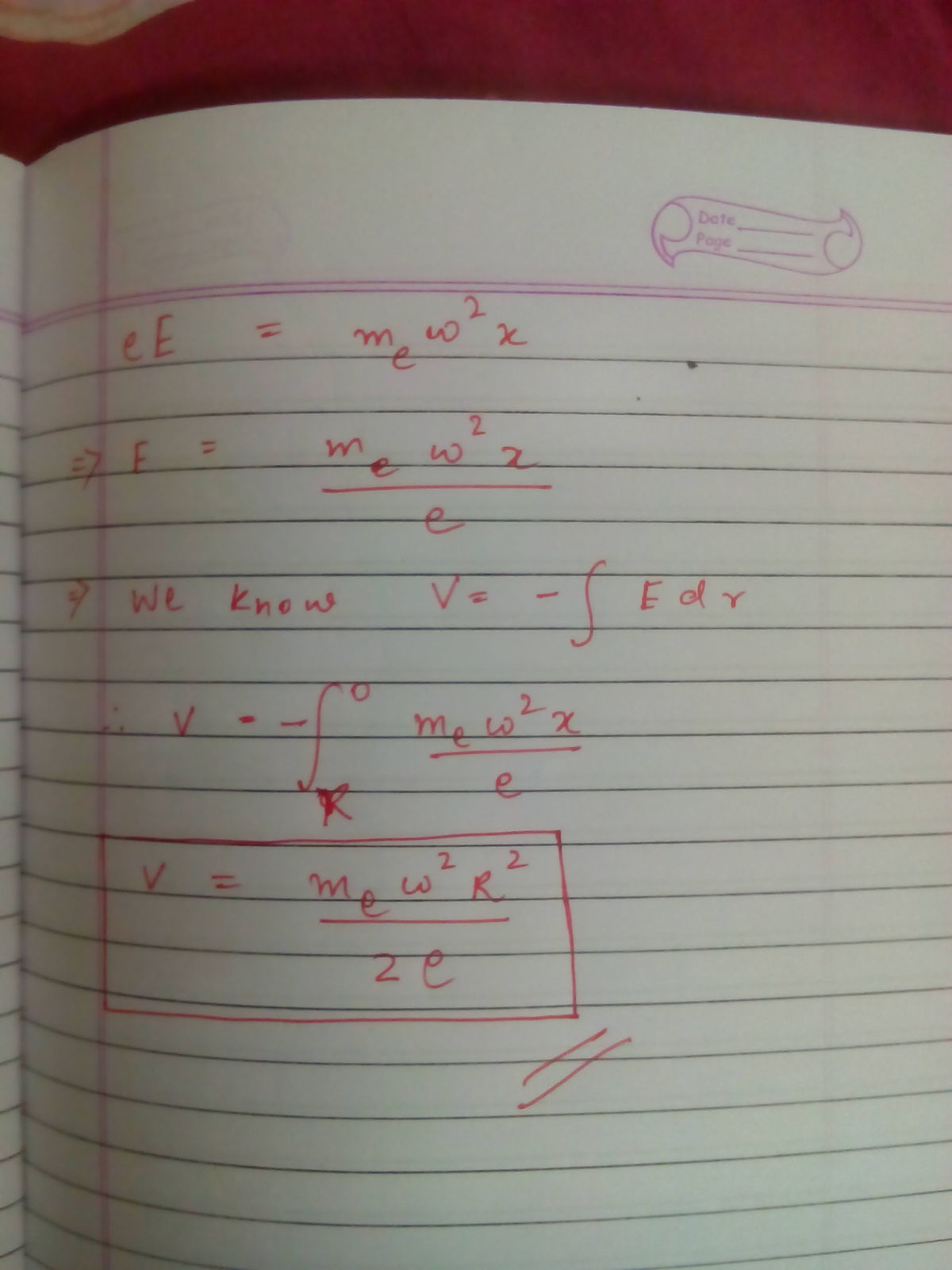Does Really Energy is Conserved..??
 A
Mettalic
disc of radius
R
is rotating about its axis with constant angular velocity
ω
Then Find The Potential difference develop between the centre and Circumference of disc.
A
Mettalic
disc of radius
R
is rotating about its axis with constant angular velocity
ω
Then Find The Potential difference develop between the centre and Circumference of disc.
DETAILS AND ASSUMPTIONS:
m e = 9 . 1 × 1 0 − 3 1 k g q e = 1 . 6 × 1 0 − 1 9 c R = 4 m ω = 1 . 7 6 r a d / s .
NOTE: MULTIPLY YOUR ANSWER BY 1 0 1 1 .
The answer is 8.
This section requires Javascript.
You are seeing this because something didn't load right. We suggest you, (a) try
refreshing the page, (b) enabling javascript if it is disabled on your browser and,
finally, (c)
loading the
non-javascript version of this page
. We're sorry about the hassle.
3 solutions
Bro, in a conducting disc, there is no resistance (ideal case) so energy is not lost due to joules law of heating, your method is absolutely correct, i too did the same way,but being a conductor, the electrons instantenously acquire the stable configuration , and no energy loss takes place (in principle)
Log in to reply
I agreed ! Sorry here I Loosely stated that it is conducting Disc . Instead of this I should state that it is "Mettalic Disc' . My Intention was to say that , disc has free electron's so that they can move , But Yes you are correct It should not be conductor .
Thanks I edited Acordingly!
At last line. It looked like (emotional emf) lol
R o t a t i o n a l k i n e t i c e n e r g y w i l l b e e q u a l t o V q 2 I w 2 = V q u s i n g t h e g i v e n v a l u e s , V = 8 . 0 0 8
This is not correct solution Since Energy is not conserved..!! You Should See My Solution.
Friend sorry to say that but here your method as well as your answer is wrong.Here the P.D does not provide the rotational energy. Here P.D develops because an electric field came into exsistance inside the disc due to the the unequal distribution of electrons. This is because , when the this is rotated ,their is no force acting on the free of metallic disc initially. Thus they are acted upon a centrifugal forces which is outward.And due to this only the electron;s conc. on the rim increases And for this; E = m ∗ ( w ) 2 ∗ R . (for electrons on rim) and V = E ∗ R . And by this the p.d comes to be =16V. THANK YOU.
Log in to reply
though your way is right answer is wrong m v 2 / r = f o r c e v = r w . therefore m ( r 2 ) ( w 2 ) / r = q E ( f = q E ) m ∗ r ∗ w 2 = q ∗ e ∗ R = V m ∗ w 2 / q = E . which comes out to be 1 0 V .

C o n c e p t :
No energy is not Conserved since For a short time There is Current is flowing in Metallic disc when Free electrons are moving with respect to metal . Finally they get stops moving with respect to metal. So current will also becomes Zero since it's duration is very small so there is no significant energy loss.
And it is understood That this rod is Rotating By an external agent so that it can move with constant angular velocity , Otherwise Rod will never be rotated with constant angular velocity.
N o t e :
Energy is loss when current is flowing is explained by
" J o u l e s L a w o f H e a t i n g "
S o l u t i o n :
It is very easy by equating Pseudo Force on electron to the Electric Force on the electron After The Equilibrium is set-up with respect to metal disc.
Let
System (electron)
&
Reference frame( metallic disc)
F n e t = m ω 2 r e E = m ω 2 r E = e m ω 2 r \E m o t i o n a l e m f = ∫ 0 R E . d r cos 0 = ∫ 0 R e m ω 2 r . d r = 2 e m e ω 2 R 2 .